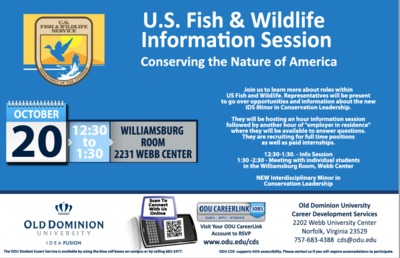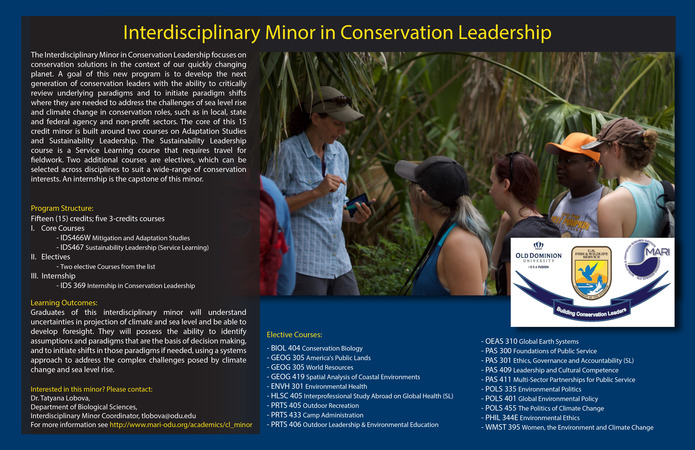|
The Interdisciplinary Minor in Conservation Leadership
focuses on conservation solutions in the context of our quickly
changing planet. A goal of this new program is to develop the
next generation of conservation leaders with the ability to
critically review underlying paradigms and to initiate paradigm
shifts where they are needed to address the challenges of sea
level rise and climate change in conservation roles, such as in
local, state and federal agency and non-profit sectors. The
core of this 15-credit minor is built around two courses on
Adaptation Studies and Sustainability Leadership. The
Sustainability Leadership course is a Service Learning (SL) course
that requires travel for fieldwork. Two additional courses
are electives, which can be selected across disciplines to suit
a wide-range of conservation interests. An internship is the
capstone of this minor.
Note that there is also a Graduate Certiciate in Conservation Leadership and most mandatory courses of this Certificate are taught together with the corresponding courses for the Minor. This facilitates interactions of undergraduate and graduate students.
The Minor requires fifteen (15) credits, which are distributed over five 3-credits courses:
- I. Core Courses
- IDS466W Mitigation and Adaptation Studies
- IDS467 Sustainability Leadership (Service learning class)
- II. Electives
- Two elective Courses (for details see below)
- III. Internship
- IDS 369 Internship in Conservation Leadership (for details see below)
Graduates of this interdisciplinary minor will understand
uncertainties in projection of climate and sea level and be able
to develop foresight. They will possess the ability to identify
assumptions and paradigms that are the basis of decision
making, and to initiate shifts in those paradigms if needed,
using a systems approach to address the complex challenges
posed by climate change and sea level rise.
The electives should be selected to extend the leadership-focused contents of the core courses. SL indicates that the course is a service learning course. To learn more about these courses, go to ODU's Catalog and enter the Course acronym and number.
- BIOL 404 Conservation Biology
- GEOG 305 World Resources
- GEOG 419 Spatial Analysis of Coastal Environments
- ENVH 301 Environmental Health
- HLSC 405 Interprofessional Study Abroad on Global Health (SL)
- PRTS 405 Outdoor Recreation
- PRTS 433 Camp Administration
- PRTS 406 Outdoor Leadership & Environmental Education
- OEAS 310 Global Earth Systems
- PAS 300 Foundations of Public Service
- PAS 301 Ethics, Governance and Accountability (SL)
- PAS 409 Leadership and Cultural Competence
- PAS 411 Multi-Sector Partnerships for Public Service
- POLS 335 Environmental Politics
- POLS 401 Global Environmental Policy
- POLS 455 The Politics of Climate Change
- PHIL 344E Environmental Ethics
- WMST 395 Women, the Environment and Climate Change
The intership is conducted in the course IDS 369. For most updated information consult the most recent version of IDS 369. Students who want to register for this course first need to contact the instructors Eddie Hill (ehill at odu.edu) and Hans-Peter Plag (hpplag at odu.edu).
Prerequisite for the internship is a successful participation in the two mandatory courses with grades equal to or better than B.
The intership requires to work for 300 hours at a host institution. Host institutions are preferably at different facilities of the U.S. Fish and Wildlife Service. Opportunities are at local facilities and facilities distributed throughout the country. Part-time options may be available for those students who cannot work a fulltime 40-hour week. After submission of the application, an interview will be scheduled with the advisors to ensure that there is an optimal match between the host, project, location, etc. and the students interests and qualifications.
Besides participating in the day-to-day work at the host institution, the intern will also carry out a case study of a real-world wicked problem relevant to the host institution. In general, about half of the internship is filled with day-to-day work and half of it focuses on the case study. The student is expected to use the MARI Case Study Template for the case study. The student will be mentored in the context of IDS 369 and will have a dedicated supervisor at the host institution. Progress reports are expected to be submitted for every 40 hours worked on the internship. Progress meeting with the mentor and student will ensure that the mentor can provide guidance and support the student, if needed.
The up-to-date list of deliverables is available at the most recent IDS 369 page.
There is currently no financial support for the internship available. However, if accommodation is needed then most host institutions are able to provide accommodation for free.
|
ANNOUNCEMENTS
[2018/02/09 - updated on 2018/08/09] Internship Opportunities
The U.S. Fish and Wildlife Service (FWS) has partnered with the Student Conservation Association (SCA) for the FWS Directorate Resource Assistant Fellows Program (DFP). DFP in 2018 provided undergraduate rising seniors and graduate students who are interested in conservation or other related careers with a full-time, 11-week opportunity that supports FWS conservation priorities. Undergraduate rising seniors and seniors who had not yet completed their degree requirements prior to the completion of their fellowship were eligible to apply for all 55 projects. Graduate students were eligible to apply for 8 of the projects. Projects included 43 biology or fisheries projects, 12 outreach or human dimensions projects, and 3 in other fields. Participation in the DFP will offered the selected fellows an opportunity to demonstrate to supervisors and managers their potential for success. For more information about the DFP program and future opportunities, please visit the DFP webpage at https://www.fws.gov/workforwildlife/dfp.html.
[2017/12/14] An InsideODU article reports in the Service learning experience in 2017.
Read the article ...
[2016/10/21] U.S. Fish and Wildlife Service visited ODU
The U.S. Fish and Wildlife Service visited ODU to inform students about job and internship opportunities

Interested in this minor? Please contact:
Hans-Peter Plag
Department of Ocean and Earth Science, hpplag at odu.edu.
A minor in Conservation Leadership with a strong service-learning component has the potential to help spread knowledge about conservation issues to students across campus, and will offer opportunities to engage in service-learning projects that address key conservation issues. There is a growing need to educate a workforce that can lead the design and implementation of adaptive conservation programs that are resilient with respect to the impacts on natural resources of climate change and sea level rise. Leadership in conservation is particularly challenged by the need to review underlying paradigms and to initiate paradigm shifts where needed. The transdisciplinary minor in Conservation Leadership seeks to provide students with a greater depth of experience and understanding of the role that integrated natural science and social science can play in developing conservation policy, especially under the circumstances of a changing climate and environment. This transdisciplinary minor offers an integrated approach to managing natural resources from a coupled human-ecological perspective, and addresses the diverse biological, physical, social, economic, and political aspects of natural resources management, community resilience, and stewardship.
This transdisciplinary minor in Conservation Leadership was developed by Old Dominion University in collaboration with the US Fish and Wildlife Service as part of a long-term, sustainable program of conservation-related service-learning, internships and leadership programs. The minor in Conservation Leadership facilitates the development of the next generation of professionals who can address conservation issues and challenges posed by a changing climate and sea level rise.
Students who could benefit from adding the Minor to their portfolio include but are not limited to Biology (Wetland Biology and Biotech), Chemistry, Oceanography (Biological, Chemical, Geological, Physical), Civil and Environmental Engineering, Earth Science Education, Economics, Environmental Health, Geography, Interdisciplinary Studies (Professional Writing, Work & Professional Studies), International Studies, Leadership, Management, Marine Biology, Park, Recreation and Tourism Studies, Political and Legal Studies, Political Science, Print and Photo Media, Public Health.
|



